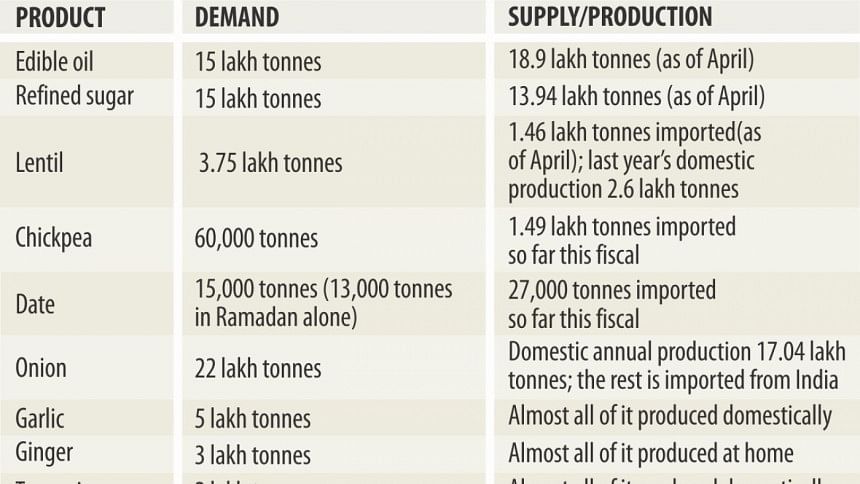Prices up on high demand

Prices of some essentials whose consumption goes up during Ramadan are on the rise already despite adequate supply, much to the worries of the consumers.
Prices of chickpea, sugar, garlic, lentil and cooking oil have jumped up compared with those a year or a month ago, according to the prices quoted in the market data of the Trading Corporation of Bangladesh (TCB) yesterday.
A market analysis by the commerce ministry in the middle of May found that the supply is good enough to meet the expected demand during Ramadan staring early next month, when commodity prices are expected to rise further riding on high demand.
Market analysts say it has become a tradition that prices of almost all grocery items would skyrocket before and during the fasting month.
Aware of this, Commerce Minister Tofail Ahmed held a meeting with the Federation of Bangladesh Chambers of Commerce and Industry, and wholesalers and retailers on May 17. He directed them to keep the market stable.
The minister said supply of all items, including rice, sugar, edible oil, lentils, onion, garlic, ginger, turmeric and dates, was higher than the demand.
“So there is no reason for their price hike on the occasion of Ramadan,” he told reporters after the meeting.
But it seems his words didn't reach the market, where chickpea prices went up by 14 percent to Tk 85-100 a kg in the last one month alone. It rose 48 percent in the last one year. The item cost Tk 60-65 a kg a year ago.
Sugar sold for Tk 60-62 a kg yesterday against Tk 50-54 a month ago. The sweetener's price rose 48.78 percent in the last one year, according to the TCB, the state-run agency responsible for stabilising the market price of some selected essential commodities.
Traders attribute the increase in sugar prices to the imposition of value added tax and a hike in tariff on imported raw and refined sugar in December last year.
Prices of local garlic rose 30.56 percent in the last one month and 67.86 percent in the last one year. Last week, it sold for Tk 100-135 a kg against Tk 80-100 a month ago.
The prices of imported onion more than doubled in the last one year, mainly because of the price hike on the international market. Last week, it sold for Tk 190-220 a kg from Tk 90-100 a year ago.
Date price remains stable, but it's certainly going to go up as its demand rises during Ramadan, which accounts for 85 percent of the annual consumption.
Apart from essentials, prices of meat, eggs and spices also went up in the last one month.
Talking about the price increase, Ghulam Rahman, president of the Consumers Association of Bangladesh (CAB), said: “There is no logic for this.”

At the May 17 meeting, business leaders assured the minister that the market would remain stable throughout the month of fasting.
A number of wholesalers and retailers told the meeting that the government should sit with big importers and producers, instead of wholesalers and retailers, so they keep the supply stable.
“In talks with importers and producers, the government should ensure the supply of essential commodities such as chickpea and sugar,” said Golam Mawla, general secretary of Moulvibazar Baboshayee Samity, who attended the meeting.
Ghulam Rahman of the CAB said dishonest businesses increased prices of commodities and services ahead and during Ramadan.
Due to efficient management and strict monitoring, prices remained tolerable during Ramadan in the last few years, except for a few items.
“But we are apprehending an exception this year,” said Ghulam, also former chairman of the Anti-Corruption Commission.
The CAB chief said the country had been practising a free market economy since the 1990s. “Now only a few businesses control the import and production of essential items. Item-based trade association has been formed.”
Rahman said dishonest businessmen hiked prices of items through syndication whenever they got an opportunity, amid squeezed competition and in the absence of monitoring.
Consumers, rights groups and experts blame the weak market monitoring and the absence of penalty to the wrongdoers for price hike.
Sohel Rana, a consumer, who lives in the capital's Old Dhaka, resented that the government always insisted that prices of essentials would not go up during Ramadan. But in reality they go up even before the Ramadan starts. “This [govt promise] is nothing but a political stunt.”
Mustafizur Rahman, executive director of the Centre for Policy Dialogue, said the government needed to look into whether imported items were being supplied to the markets on time, instead of “going from market to market with sticks in hands.”

 For all latest news, follow The Daily Star's Google News channel.
For all latest news, follow The Daily Star's Google News channel. 








Comments